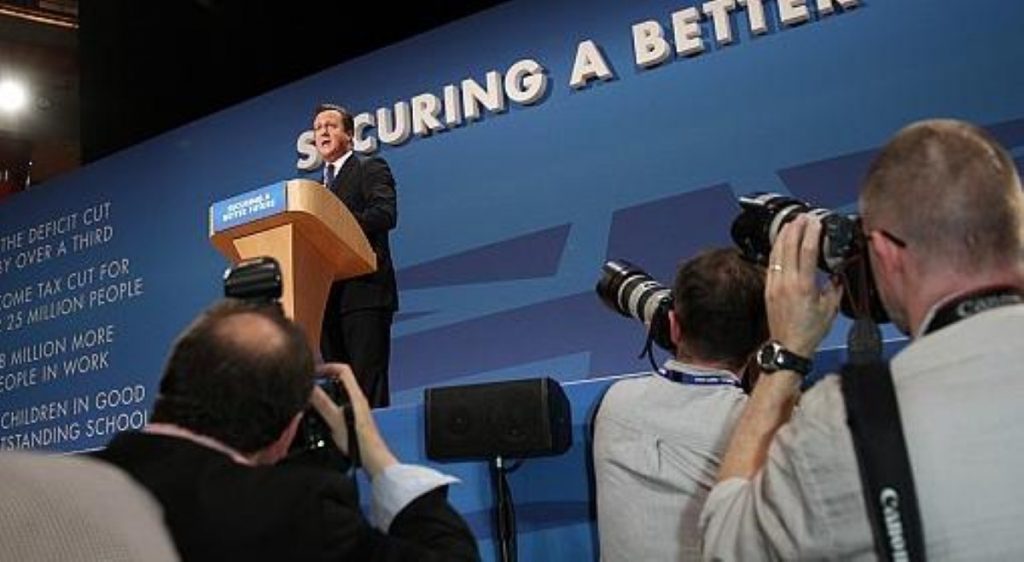Forbidden for so long, Cameron unveils the Tories’ forbidden Viagra
Promising tax cuts – the ultimate turn-on for the Tories and vote-winner for the electorate – guaranteed this speech would be a success for David Cameron. But the prime minister had a bigger task to overcome in what could yet be his final conference speech as leader of the Conservative party.
Cameron wandered on to the stage slowly. He had all the languor of a man taking a lap of honour, a man happy to soak up the applause for governing the country. It seemed appropriate, for there wasn't the customary build-up in excitement to this speech. There was no real sense of anticipation. Delegates were calmly expecting something workmanlike.
What they got was something much better. Even after nine years in the job, David Cameron is still not entirely a known quantity to the British people. He does not stand for much that is not universally acceptable. "I'm not a complicated man," he told delegates. So, by weighting so much of his speech about the inadequacies of Ed Miliband, he had to do something to make himself look different. This was his big challenge. The fact he succeeded made it one of his more successful speeches.


The first distinction was one of statesmanship. There was no risking committing this speech to memory. Prime ministers are much too busy for that sort of thing. Instead Cameron stood behind his special lectern – a more curvy wooden affair than the white plastic lump every other delegate had to speak from – and fired out messages to all and sundry.
There were messages on Europe and on the armed forces, but his most powerful warning was to the British citizens who fly out to aid the Islamic State. "You are an enemy of the UK," he said gloweringly. It had a tremendous effect on this already patriotically-minded audience, which was clutching miniature Union Jacks like it was the last night of the Proms and was only just coming down from the high of applauding a Second World War veteran. Cameron's warning triggered some sort of chemical overload in their minds.
And then came a William Hague impression. It was one of the odder segues in this speech, a transition from terrorist exterminator to light entertainer. And Cameron's lighter side was not especially well-displayed, really. He admitted he struggled with his children's homework. One reference to Twitter made him look like a fuddy-duddy old granddad.
Instead he portrayed himself as a dad whose children run off to school "without looking back". He may as well just have stood up and shouted 'I am boring'.

The most effective personal touch came in the section on the NHS – a policy area where the Tories trail Labour by a long way. If Miliband has bragging rights over Cameron on any one area, it is this. "For me it is personal," the prime minister declared. He deeply resents the "complete and utter lies" of the opposition. "How dare you," he would have spluttered, were he not being overcome by a deep and profound emotion.
The audience responded. Not so much to the words, but to the look in his eyes as they began applauding. He stood there, looking angry and sad all at once. It was that which got them on their feet, delivering the most heartfelt standing ovation of the speech. This was much more intense than the lacklustre final point. It was Cameron's best moment, without doubt. And it put him firmly against Miliband, both personally and politically. Mission accomplished.
Then comes the small task of winning the next election. This speech was always going to be a key moment for the Tories: the leader's address at their final autumn conference before May 7th 2015 would not be allowed to pass by without a big pitch to voters. It can be summed up in two words: Tax cuts.
And when this audience was allowed, after so many years of denial, to savour the words "tax cuts", they drooled with delight. You could see them pushing their lower lips out, wobbling with the strength of feeling at what had for so long been a forbidden delight.
The twin pledges of raising the income tax threshold to £12,500 – and shifting the 40p rate threshold up to £50,000 – will give Tories something simple, easily understandable and just plain old right-wing on to campaign with next year. The Conservative party had almost forgotten how much it likes this. Economic discipline is the record in government, yes, but this future narrative allows ordinary grassroots Tories to dream once more. Nothing makes them love Cameron more than this.
Outside the conference hall, the relief showed. But while this uplifting speech was necessary to galvanize supporters for the campaign to come, it has also convinced Tories more than ever they can overcome the odds and win an overall majority. Cameron said as much in his speech; it was reminiscent of Nick Clegg's 2009 declaration that he earnestly and seriously wanted to be Britain's next prime minister. Any Conservatives reading this might scoff at the comparison – which only goes to show how effective their leader's exhortations have been.

